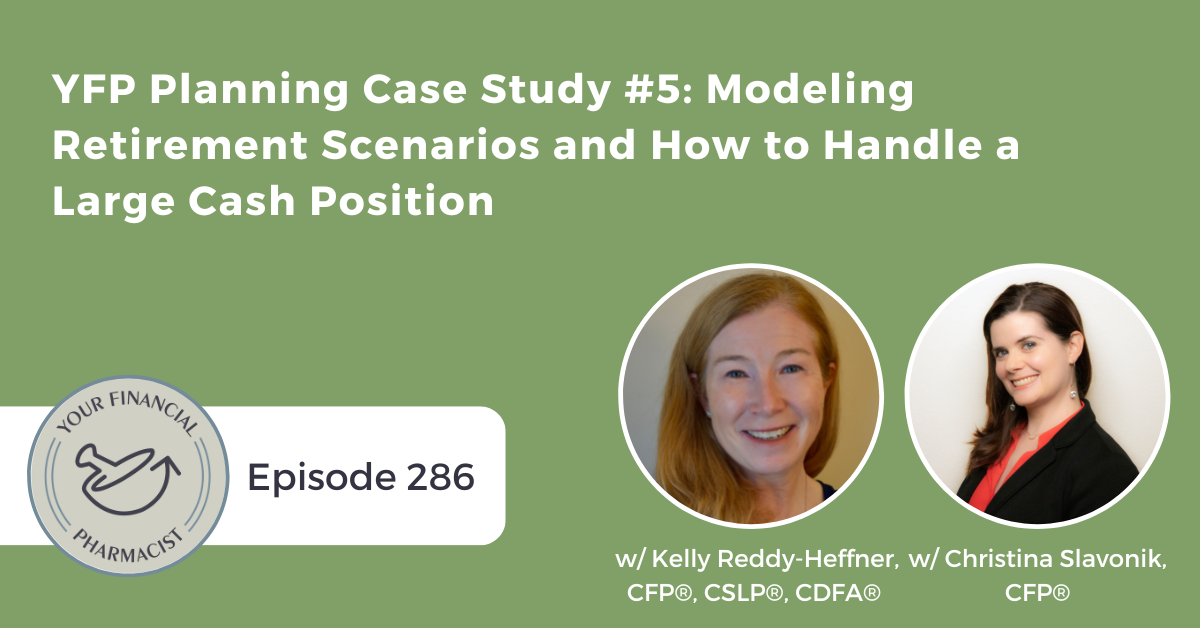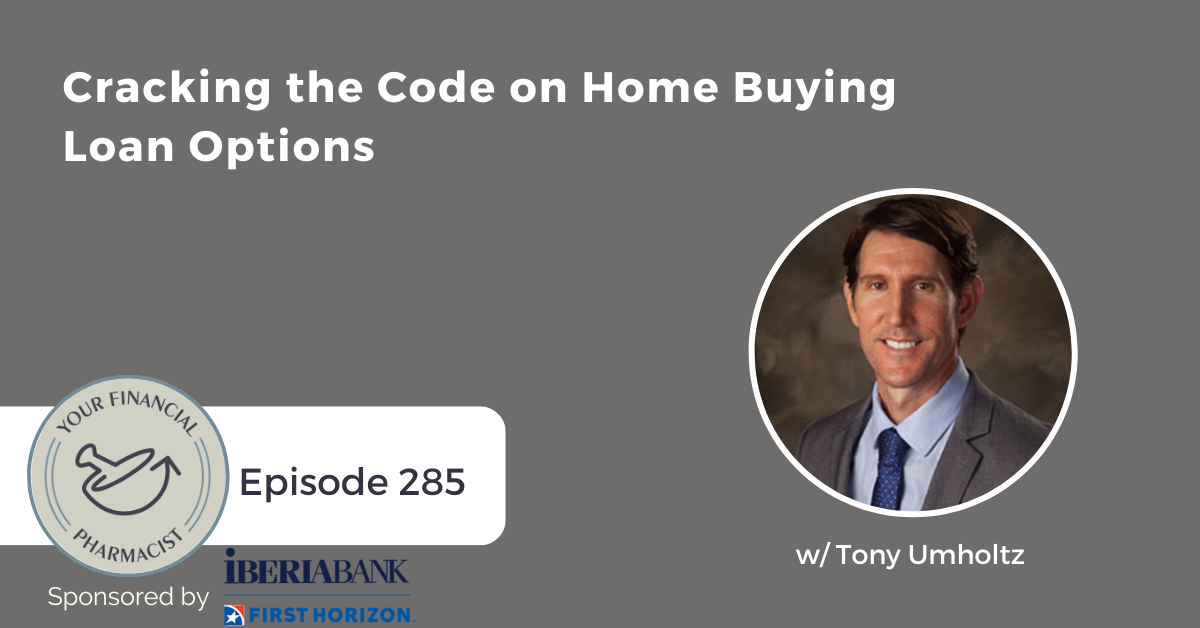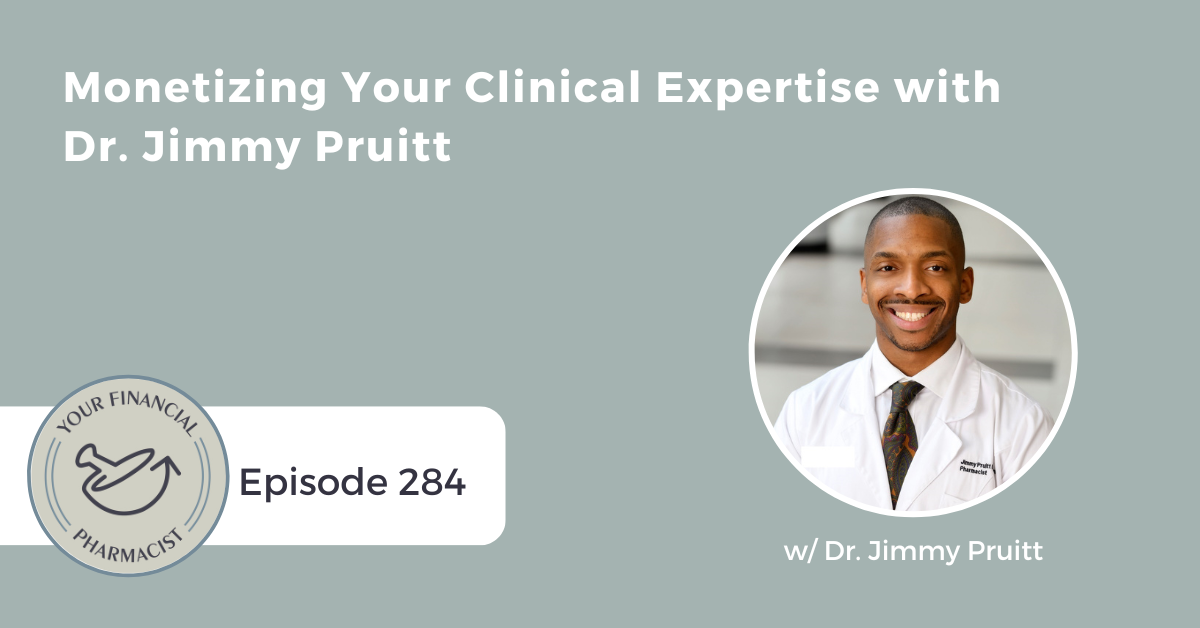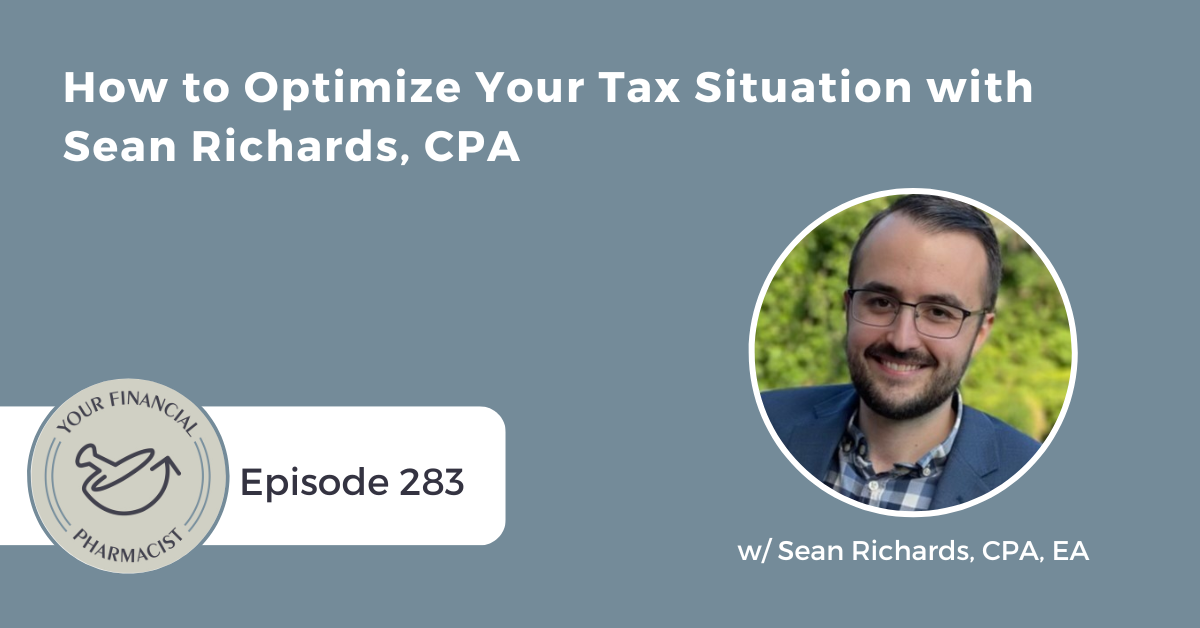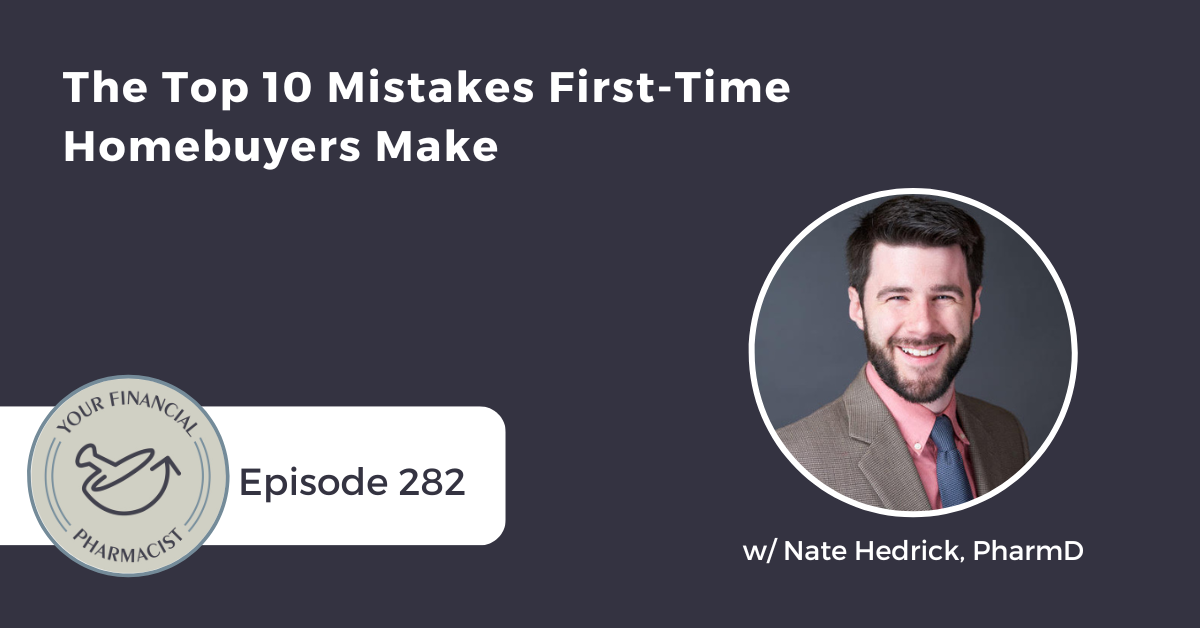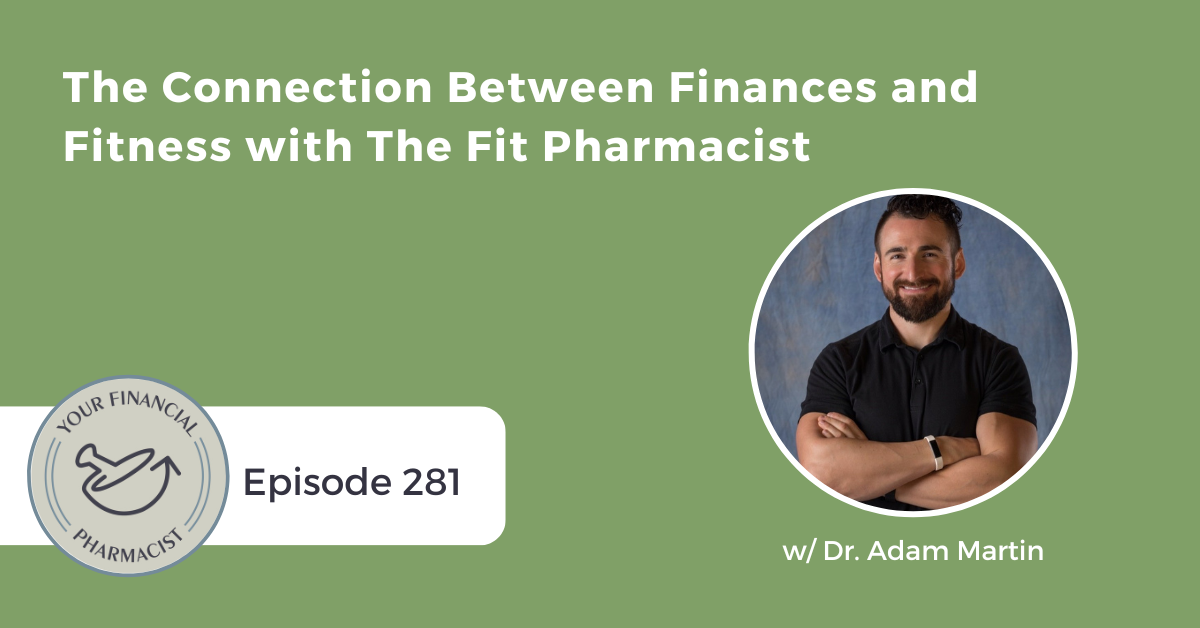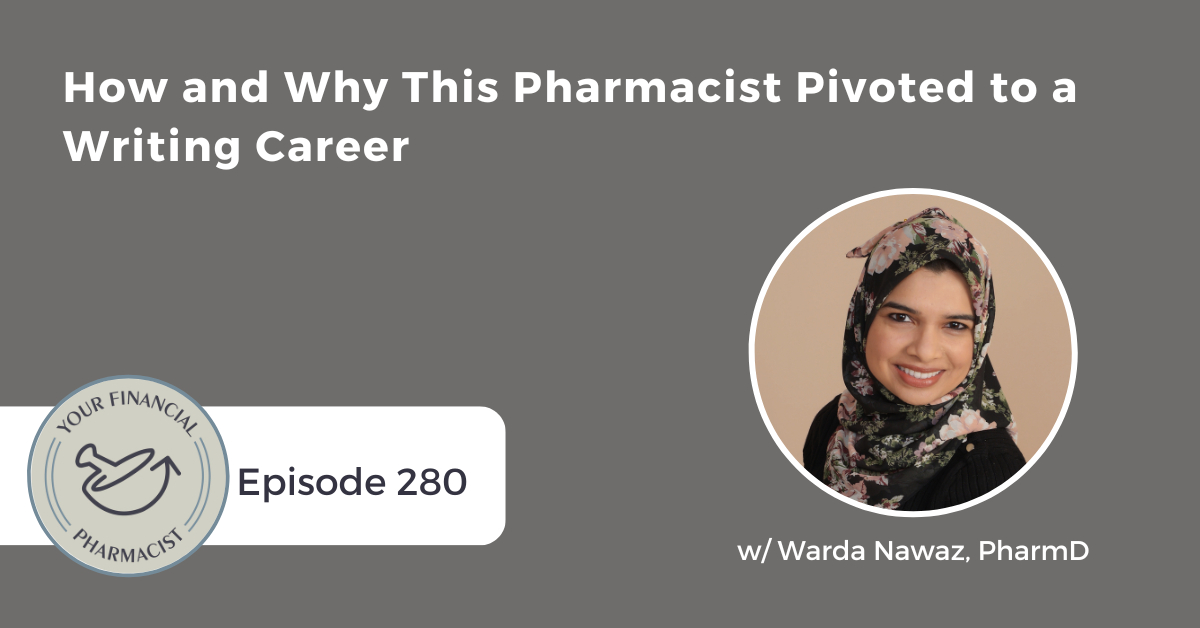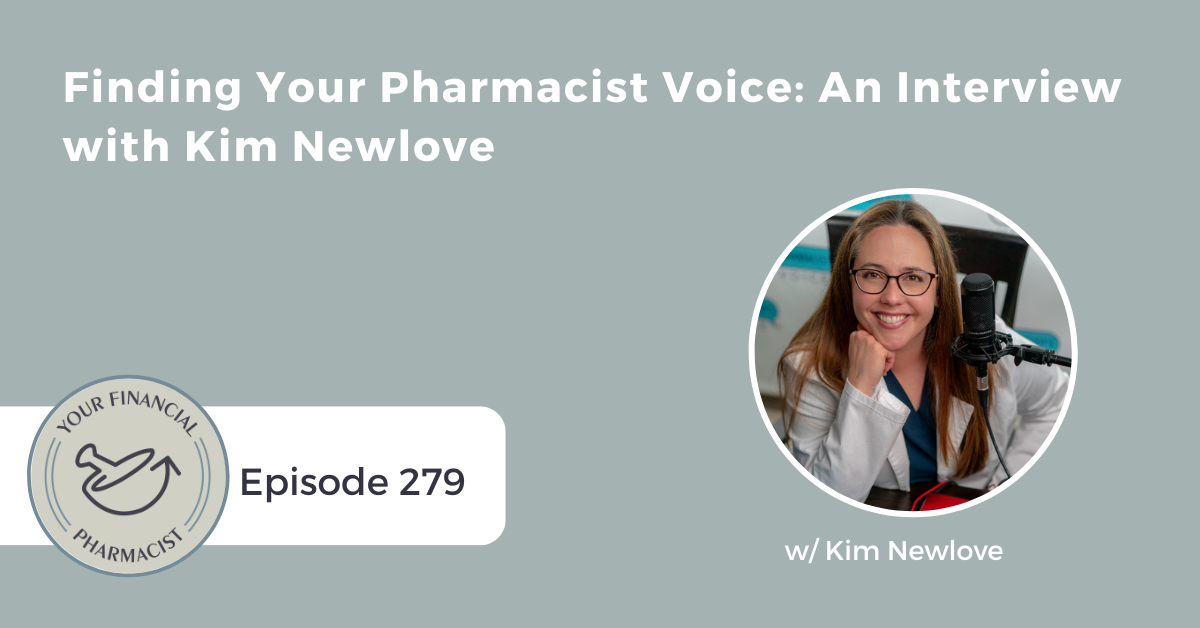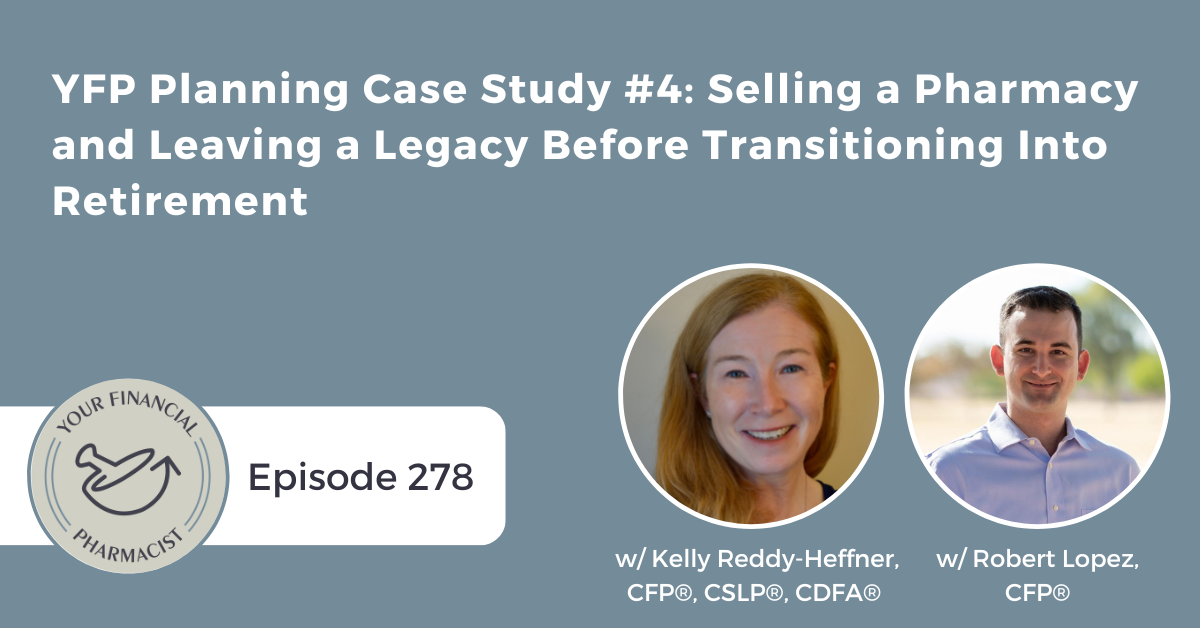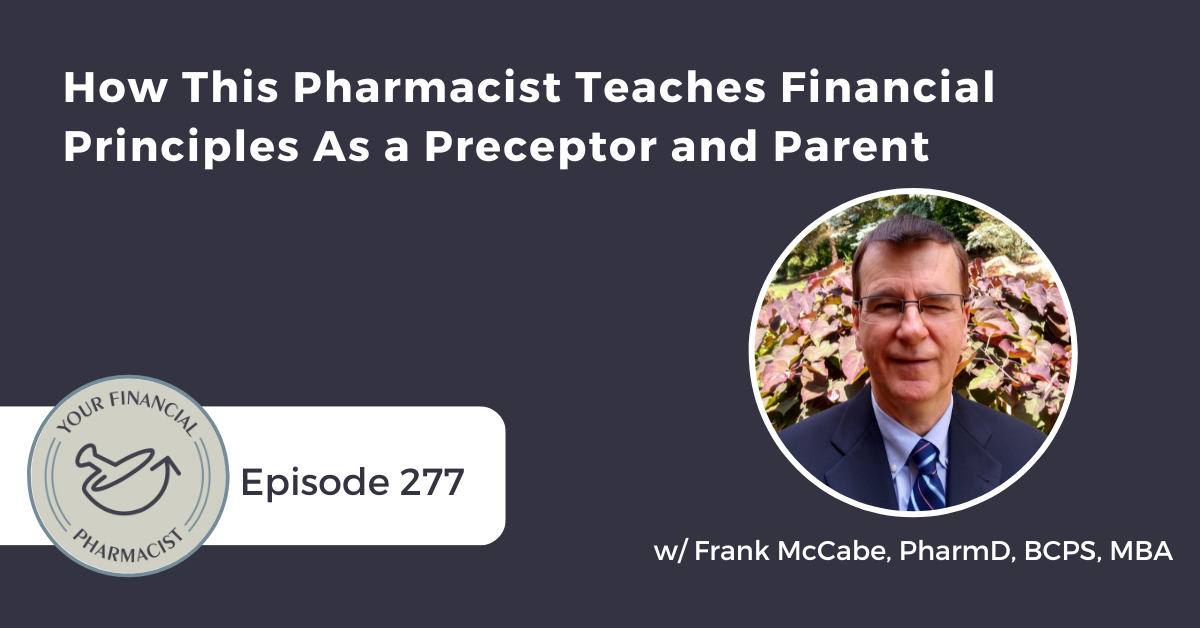YFP Co-Founder & Director of Financial Planning, Tim Baker, CFP®, RLP® is joined by Kelly Reddy-Heffner, CFP®, CSLP®, CDFA®, and Christina Slavonik, CFP® to discuss retirement scenarios and how to handle a large cash position in this YFP Planning Case Study.
About Today’s Guests
Kelly Reddy-Heffner, CFP®, CSLP®, CDFA®
Kelly Reddy-Heffner, CFP®, CSLP®, CDFA® is a Lead Planner at YFP Planning. She enjoys time with her husband and two sons, riding her bike, running, and keeping after her pup ‘Fred Rogers.’ Kelly loves to cheer on her favorite team, plan travel, and ironically loves great food but does not enjoy cooking at all. She volunteers in her community as part of the Chambersburg Rotary. Kelly believes that there are no quick fixes to financial confidence, and no guarantees on investment returns, but there is value in seeking trusted advice to get where you want to go. Kelly’s mission is to help clients go confidently toward their happy place.
Christina Slavonik, CFP®
Christina is a Certified Financial Planner™ located in Texas and has over 15 years of financial planning and industry experience. She received her Certificate in Financial Planning from Southern Methodist University.
Christina is passionate about helping clients live their best lives now while not losing sight of the future. She enjoys the collaborative approach of creating a custom financial plan with her team at YFP.
Episode Summary
YFP Co-Founder & Director of Financial Planning, Tim Baker, CFP®, RLP®, is joined by Kelly Reddy-Heffner, CFP®, CSLP®, CDFA®, and Christina Slavonik, CFP® to discuss various retirement scenarios and how to handle a large cash position in this YFP Planning Case Study. Tim Baker introduces the fifth case study, examining the fictitious couple, Jane Smith and Tyra Lee, from Westchester, Pennsylvania. Jane, age 59, is a Certified Registered Nurse Anesthetist, and Tyra, age 60, is a pharmacist working part-time. Jane and Tyra also have two teenage boys, Thomas and Robert. During the discussion on this case study, listeners will learn about the couple’s plans to retire in three to five years, earlier than previously expected. Tim, Kelly, and Christina discuss options for care and long-term care insurance concerning Jane’s elderly mother, college plans, and a recent car purchase for their children. The discussion leads to considerations for how the couple might handle their massive cash position and whether or not to pay off debts with their reserves. Tim, Kelly, and Christina talk through the couple’s housing situation as they transition to retirement, their plans for purchasing a cabin or potential forever home, and how that may impact the financial plan.
Links Mentioned in Today’s Episode
- YFP Planning: Financial Planning for Pharmacists
- Schedule a free Discovery Call with YFP Planning
- YFP Tax
- YFP 108: How to Effectively Talk with Mom & Dad About Their Finances
- Case Study #5 Summary Sheet
- Your Financial Pharmacist Disclaimer and Disclosures
Episode Transcript
[INTRODUCTION]
[00:00:00] TB: You’re listening to the Your Financial Pharmacist Podcast, a show all about inspiring you, the pharmacy professional on your path towards achieving financial freedom.
Hi, I’m Tim Baker and today I chat with two important team members at YFP planning Kelly Reddy-Heffner and Christina Slavonik, both CFPs.
In this episode, we discuss our fifth case study of a fictitious couple Jane Smith and Tyra Lee, and their teenage kids Thomas and Robert. Jane is 59 and is a certified registered nurse anesthetist while Tyra, age 60, is a pharmacist working part time. We cover a bevy of topics that include in retirement in three to five years, where we model out different scenarios using our financial planning software. We chat about long-term care insurance, how to handle their massive cash position, and whether they should pay off some debt, their housing situation as they transition into retirement, college planning for the boys, and potentially how to handle care for Jane’s elder mother.
[INTERVIEW]
[00:00:58] TB: What’s up everybody? Welcome to YFP planning case study number five. So, I am joined today by Christina Slavonik and Kelly Reddy-Heffner, two of our CFPs on the YFP planning team. So, Kelly and Christina, welcome.
[00:01:14] CS: Thank you, Tim.
[00:01:15] KRH: Thanks, Tim.
[00:01:17] TB: So, we are recording this right before Thanksgiving. So, excited to get this recorded in the books and then enjoy some time off with family. I just would like to say that we are very thankful for all the listeners out there, thankful for the community that we’ve built, thankful for the two of you, Christina and Kelly being part of the team. And yeah, just really excited for the upcoming holiday season. Let’s jump into it.
So today, we are exploring a couple in Westchester, Pennsylvania, Jane Smith, and Tyra Lee. So, Christina, you’re going to take us through the first part of the fact pattern, Kelly is going to get into goals. And then, I’m going to talk about the wealth building, wealth protection tax and some of the miscellaneous stuff. And then we are going to dissect this client case study and see what are some planning opportunities? What are the things that should be discussed with the client, that we should really get in front of to make sure that they are on track with their financial plan? So, Christina, if you please kick us off on Jane Smith and Tyra Lee.
[00:02:18] CS: Sure. So, the clients we’re looking at today are Jane Smith, who is a CRNA, aged 59, makes about 194,000 a year and Tyra Lee, who’s a part time pharmacist, age 60, salary is 65,000. They are married filing jointly. They have two sons. I have Thomas, who is age 17, and is currently a student, and Robert, who was 14 and currently a student as well. They reside in Westchester, Pennsylvania, annual gross income is 259,000, which breaks down into monthly around 22,000, and then net after taxes and whatnot, 15,000.
Expenses for these people are fixed at about $5,977 a month. Variable expenses are the 4,500 a month, and the savings of about 4,400 or so. Their current living situation is they’re in a five-bedroom, single-family home outside of Philadelphia. They apparently have a great first floor master. And if Jane’s mom had to move in, they could accommodate her as she is ill and cash resources are currently limited.
[00:03:37] KRH: Complicated, right? This seems like a scenario that we’re seeing a little bit more of with some of our like pre-retiree clients, just that intersection between nearly adult children, but not quite adult and parents kind of having some needs as well. They both would like to retire over the next couple years. But they are thinking through making sure the children are taken care of, parent needs are also taken care of. They have a fairly large cash position and are not sure if they should leave it in cash or pay off some things. They have that home in Philadelphia that they like, it’s functional, but they’re not sure that this is the forever home where they want to stay indefinitely.
With the kid’s college tuitions, one tuition has is about to start, I think based on the age. One is a little bit further in the future, but they kind of want to see what the 529s are going to cover, and what they can maybe do out of pocket and what they simply can’t do. They’ve asked about long-term care insurance, kind of understanding the premiums and how those could change in the future. They might want to buy a lake cabin, maybe that could be the forever home or the primary residents. If they wanted to retire earlier, they had started at age 65. Could they do it like 62, 63? They’ve got a little bit of debt. They have a car note for their own vehicle, 1.9% interest rate. There’s three years left on that note. They also bought a car for the teenage children, so there is a payment of 545 per month, interest rates 2.25, three years also left on that. Obviously, they made those purchases prior to our current interest rates, or it would be much higher. They also have a reasonable interest rate on their mortgage at 2.75. But it is a pretty recent purchase. So, the amount left on the mortgage is pretty high and that monthly payment is 2,858. So, early in that, and that’s one of their questions.
[00:05:58] TB: So, picking up on the asset side of the of the ledger, Kelly had mentioned that they do have a good amount of savings tucked away. So, 143,000 in a joint savings account, 3,000 in check in, and then another 9,000 in an HAS that’s Jane’s. From a 401(k) perspective, looks like Jane is putting in 11%, which is the max for 2022, 20,500 into her fidelity 401(k) through her employer that’s invested in a target date fund for 2030. Tyra also has a 401(k). She’s putting in 31.5%, which is also max amount of 20,500.
Now, for the two of them, one of the things we’ll talk about that you have a catch up available if they want to do that, but she’s also her Vanguard, she’s in a Vanguard target date 2030. Jane has a Roth IRA. This is from a previous employer. It’s invested in a Vanguard 2030 fund. She’s not contributing anything to that presently. Tyra has a SEP IRA from her previous consulting work as a pharmacist. It’s 100% in the S&P 500. So obviously, there’s some little bit differences there in their allocation. And then they also have a taxable account that they’re putting in about two grand a year, $167 a month into a Vanguard target date 2060 fund.
So, it looks like this is going to be maybe a retirement fund, maybe for the boys. We have to kind of get some clarity on that. They do have a primary home that’s valued at 920,000 versus the 683,000 and change that’s left. And then, looking to potentially, maybe buyout another property that they could transition to. We’ll talk about that in a bit.
Overall, you’re looking at total assets, about 1.9 million, total liabilities of just over 725,000. So, net worth is about $1.25 million. We look at the wealth protection stuff. Jane has an individual policy, 1.5 million that expires at age 65. She also has a group policy through employer which is one-time income 194,000. Tyra has a $750,000 policy that also expires at age 65. And then she also has a onetime group policy through employer which is 65,000. They both have short term and long-term disability through their employer that pays out a 60% benefit for short term and long-term disability. They both have their own professional liability policies. And the estate planning documents are up to date.
But one of the things that they’re not sure of is if Jane’s mother has anything, which obviously can affect their financial plan. From a tax perspective, they use YFP Tax. So, thank you very much for that. They’re concerned about their pretax retirement investments and when Roth conversions might be helpful, so obviously there could be time where they’re maybe sunset into retirement, so they might be in a lower tax bracket. So, it might be beneficial to convert some funds over to the Roth. And then Tyra is willing to work more over the next several years if both can retire early. They’re wondering if they should pay off their debt based on the interest rates, and they also want to make sure that they are maximizing the FASFA for their sons.
So, a lot of stuff to talk about. What are the big things, I guess for you, Kelly, that jump out, that you would want to tackle first with regard to Jane and Tyra?
[00:09:07] KRH: Probably the first two is just like the taxable account, the cash position, like having a good understanding of what they have those in place for. Is it a future expense that’s very short term? Is it something more intermediate where we could do a little bit more with those resources? I do think for the wealth building, probably three of the investments are okay-ish, like the target date funds of 2030. I would want to just double check what’s in those funds, make sure they’re close to the right asset allocation, but the SEP IRA for retirement is a little bit more aggressive than it should be for their age, and I suspect the Vanguard target date 2060 potentially could be as well. That seems to make it seem like it’s for retirement, if it’s in the target date fund, but something that I would agree should be confirmed, for sure. But also, what Jane’s mother’s need is, I think, if some of the cash has been earmarked towards helping with some of her care, that would make a difference in kind of the recommendations for how to best put it to work, short term, midterm or long term.
[00:10:27] TB: My thoughts on the on the estate plan documents. I definitely would run out would want to run those to ground. We had some content about a book about how your parent’s estate planning or lack thereof can really affect your own financial plan. “Mom and Dad, we need to talk.” We can link that into the show notes. But I think that’s a vulnerability, and we want to make sure that that’s lined up. So, we’re not having to sue for conservative ship or do things that, if those documents are in place, are really going to put us in a bind later on.
From an asset allocation perspective, Christina, how would you broach this subject? Because obviously, there’s, Kelly’s point, digging in to fidelity 2030 target date fund, Vanguard target, not all target date funds are created equal. We have one that 2030 is probably a little bit – we’re going to be a little bit more conservative than the S&P 500, or the 2060. So, what would be your process to kind of get them in the right model right now, three to five years from retirement, they’re probably going to want to be the most conservative that they ever want to be. Because if the market dips now, it’s very hard to uncover, and that’s where we have to start having conversations of potentially pushing retirement age back, which is not a fun conversation to have. So, from an asset allocation perspective, how would you tackle that with Jane and Tyra?
[00:11:46] CS: Sure. So, first thing I’d want to look at is taking a deeper dive, like what exactly is built into these target date funds? How are they allocated? Mostly looking at the ratio of equities to bonds. So, someone who’s about three to five years out, they can be a little risky, but we want to see more of the bond exposure. Things starting to dial back, their savings years, so maybe looking more at a 60% equity, 60% to 70%, equity 30% to 40% bond allocation for them. And yeah, and then revisiting the S&P 500, for sure, since that is definitely a lot more aggressive than we would want them to be invested at the moment.
Also, another thing to consider too, Tim is we got to get people thinking too, what does my cash needs? What are those going to look like, as I’m getting closer to retirement? So, yeah, we might have some money earmarked that we could be investing, but we still need to have money set aside for emergency fund. Maybe, as you get closer to the retirement date, like have at least a year or so of cash saved up, that is one thing that we’re considering keeping it in a money market, or high yield savings type of environment as well.
[00:13:06] TB: Yeah, for sure. I mean, I think really looking at our processes to really look at the investments by approaching the client with a risk tolerance and seeing what comes out there. And then kind of comparing that to what we think their risk capacity is. So, risk capacity being like, what is the risk that they should be taking? The risk tolerances, what is the risk that they want to take? And they should be taken to your point, Christine, a lot less risk, because we want to really protect that principle. We don’t want to lose anything, and potentially have to push back the retirement or do something different because of where the markets are going.
So, I think foundationally, making sure that that’s there is going to be really important. And to Kelly, your point, 143,000 in cash money savings is a good chunk of change. Christina, you mentioned like, you didn’t say the bad word, but the bad word would be like, what is the budget had been through retirement, which is going to shape the emergency fund. It’s going to shape a lot of things, what’s the retirement paycheck going to look like? The clarifying questions I would want to have is like, what is that 143,000? Is that to pay Thomas’s tuition next year? Do we run that money through the 529? I don’t see a 529 on the balance sheet. But the benefit that PA residents get from a state tax deduction is pretty generous. I think it’s 16,000 per beneficiary, 30,000, 32,000 per filing jointly.
So, if you can shelter some of that, that would be great. But what is the savings account for? What’s the taxable account for? Is the taxable account, is that earmarked for retirement? They’re in a position right now where I’m assuming Jane, if she’s not beyond 59 and a half, she will be sued. So, all of these 401(k)s, Roth IRAs, SEPs, like they can be accessed and used for whatever purpose so we can use some of that money for things that are other than retirement, but I would just want to clarify, what’s the savings account for, what’s the taxable account for, et cetera, before we kind of get into how to deploy these accounts, and again, making sure that, we need an emergency fund, let’s not invest it in a risky way. But we want to get that yield. I think, high yield savings accounts are now at 3%. You can get CEs at 4%. Even the eye bond is still attractive. I think it’s 6.8% plus a fixed rate at point 4%. So, there’s some liquidity issues there. But that might be a good place to park some dollars. You can put up to $10,000 a year there.
So, Kelly, if they’re asking, are we on track for retirement? How do we best answer that question? I’m a visual learner. So, are there things that we can show the client to kind of model that out a bit? What’s that look like on your end?
[00:15:50] KRH: I think these are very, very good questions that we do get from clients. And we ask clients to work on uploading and linking documents to eMoney. So, it’s a software tool that we use, that can be very helpful and looking at where things are at. Even to answer the question about the 529, they’re not listed on their spreadsheet. But they do have –
[00:16:17] TB: Oh, they do have. Okay, good.
[00:16:19] KRH: – do have them. And actually, they don’t pull across on a balance sheet either. So even when we’re working with eMoney, because they’re technically assets for the beneficiary. So, there are the two 529s in place. And you’re right, that Pennsylvania is quite 529 friendly with the rules. But when we get that question, like, good, not good, like we do a nest egg calculation, but then we can also go in the eMoney and look at goals, just to see overall. I’m going to pick one of the scenarios that they were kind of asking about the retire early. The baseline facts is like, based on now how things look towards retirement, and they originally had an age 65.
So, we’ve got the 65 in here, this 95% would suggest like, looks pretty good for being able to retire at that age. We have a couple expenses embedded in. We’ve got college costs, but we can add in college, I mean, we could probably spend the whole rest of the day and Thanksgiving, turkey dinner, talking about things we can do in eMoney. But just to give a high-level overview, we can enter education as like only the 529s cover that expense or do they want to pay out a cash flow a certain amount to help with that goal. We can enter specific school, so they wanted to see public school, public state school, and they wanted to see a private school just to have a comparable.
So, we’ve added in both of those. From here, I like to look at some cash flow reports, so this gives you a like, this looks reasonable and doable. Even the retire early like looks pretty reasonable, but then it is good to see the layers just to make sure things are input pretty well to reflect what the client wants to accomplish. Do the expenses. Tim, you’re right, spot on, are the expenses accurate for what the client is looking to do? So, we entered in living expenses, their liabilities, going to be the mortgage. They have some other expenses added in so they have car purchases every couple years. This is the 529 expense coming across.
So yeah, we do like to take the information that the client provides. Our data is only as good as what accounts are linked. But then we can go back in and run some of those scenarios too. Can they buy the lake cabin? Now, it’s entered as an additional property, not instead of their primary residence. This is less successful. We do like to see above 80%. I guess, I probably on the conservative side like to see 85 to 90. I think when Christina and I look at scenarios, because there’s things that can happen in between that really do impact. Like this really does not include Jane’s mom. Does a certain amount need to be embedded to help Jane’s mom and what is that amount per year? But we can add that? Is it an extra $1,000 a month for her care? Is it 500? Is it something different? But those are important combo situations like what do Jane and Tyra collaboratively think they can do? The conversation is really important with both of them. They have to be on the same page about what they’re willing and able to do and maybe make tradeoffs about to help in that scenario.
[00:20:19] TB: Yeah. So, for those of you that are listening to this, maybe in the car, don’t necessarily see the visual, if you’re not watching us on YouTube, on our channel, what Kelly is really presenting here is an illustration of what ifs. If we buy a lake house to retire early, what is the probability of success, if we have to use these monies for different goals that we have? Are we still going to have money at the end of our plan?
So, what the tool does is that it uses simulation, it uses 1,000 randomly generated market returns and volatility, called trial rounds to say, okay, 95% or 950 times out of 1,000, there’s going to be money leftover of the plan, and anything above the threshold of 80% or 82%, is good. And typically, if it’s lower, we’re going to adjust the plan as we go to make sure that there is money left over. So, the idea is to keep, there is money, between now and then when you when you pass away.
So, the nice part about this is it allows us to kind of toggle on and off different scenarios, to see how it affects the overall nest egg, so to speak, and provide some math behind it. So, the nice part about this is that, you can kind of talk to the client, and you can talk to Jane, you can talk to Tyra and you say, of all these different things that we’ve extracted from your goals, whether it’s a cabin, or being able to take care of your mom, or retire at this age versus this age, what’s the most important? And then basically turn those on and off to see, okay, once we get to this threshold, then the plan might be in jeopardy and we can adjust from there.
But I think this is great, and a visual perspective, and this is the way I learned. I think, like from a client impact, I think, this is huge. Yeah, this is great modeling Kelly. Christina, when you look at this particular client, at least from some of the models that we’re seeing, are there things that you would want some additional information, whether it is Jane’s mom, or maybe more additional information on what is the goal for the education planning? Is it the put the boys through four years of school? Is there a certain percentage? Are we using some of that? Are we counting on scholarships? Are we counting on debt? What are some of the approaches that you would take with the client to kind of refine this out a bit?
[00:22:39] CS: Yeah. So again, just digging more into the weeds. And to your point with the education. Yes, are they going to be relying strictly on loans? Or are there scholarships involved? Or is it a combination of all three? Are they going to be funding, maybe a third of it, from their cash flow? Some from the 529, others from scholarships?
So, we’d like to see some diversity, so to speak, when it comes to funding college needs, especially if 529 is not going to carry the weight. And then looking at savings and withdrawals for the education expenses, as is it does look like there is going to be a shortfall. So, having more of those conversations, again, what is the 143,000 saved for? Is part of that going to help Thomas and Robert. But then again, looking back at what they had given us with the 529, how is it invested? Kelly, when you had shown us that it looked like it was probably just in the money market at the moment, and I would be more curious to see, well, A, is it linking properly. But B, is it indeed invested? You have to have a good solid allocation in there, if you want that money to work for you, over the period of time they have left.
[00:23:53] TB: And probably a good chunk of that money for Thomas, who’s the 17-year-old should be for a money market. It’s almost like you were saying like you want, maybe, like a year’s worth of cash for retirement. That might be true for the first year or so for tuition. But then the balance of that should be invested. I think Thomas had 45,000. So, a good chunk of that should be either in a balanced fund or something like that. For Robert, who is 14, and he saw us four years until the first year, we probably can be a little bit more aggressive. And then, as we get closer, same thing with retirement, we’re having more of a bond allocation, less of an equity allocation. The money mark is going to do well today just because of inflation, but you’re also being killed by that purchasing power that’s kind of being eroded every year.
So, what Kelly is showing right now on the screen is kind of the shortfall, the projected shortfall for the education expenses and it basically showing us what percent is underfunded, which is not necessarily a bad thing. We kind of talked about the rule of 33% and where we want, if we’re saving for a kid, a kid’s college, and we don’t really know what our goal is, it might be okay, we’re going to try to get x amount into a 529, pay x amount from , in that year, that’s the salary in that year for college. And then maybe the last third comes from scholarships, student loans, et cetera.
So, this is kind of showing us what has been underfunded so we can kind of plan for that and know what to do, so great stuff. Kelly, can you shift back to the case study real quick, I want to have a discussion that we really haven’t had much discussion on. We talked about Social Security in the past, I think, again, pulling their statements is going to be really important to see where they’re at. But I really want to talk a little bit more about the long-term care, and then Medicare decisions. So, walk me through, how would we approach those? Obviously, these are two things that, I think, there’s a lot of kind of negative press around long-term care insurance. It shouldn’t be something that we sell fund. What is long term care insurance? Why do I need it? So, I guess, let’s start there, how would we approach this particular risk that Jane and Tyra have to their financial plan?
[00:26:12] KRH: I will admit, it is a little bit newer territory for us, like typically, with our client base, we’re not having a ton of conversations about an immediate need. So, we have done some work recently, just to be better educated and to kind of get up to speed on some of the products. So recently, talking through kind of two products. One is a pretty traditional, like, pay a premium, get a policy, and it covers a certain amount of care per day, calculated out on an annual basis. And one of the biggest issues with those policies is like premium goes up. We had some education that I found to be very concerning, and enlightening, just so we know the premiums can go up. But with state regulations, there’s not a ton of regulation on how much the premiums can go up. So, that’s one of the challenges is like, if you buy a policy, you have it for like 10 years, your age 75, and the premium goes up and it becomes unaffordable. Pay 10 years into it, but you have to stop, that’s a concern.
So then, there’s a hybrid product that has some insight into that premium piece, but also provides a death benefit. Because the other concern is you never need the long-term care. You’ve paid for this premium, you have, unfortunately, a death event, without any care happening, and all that money has not been allocated anywhere else. So, there are some things out there. I think that’s kind of one of the things we’ve been working through, is understanding those policies, and then write the comparable, like many insurance products, is like if you paid for it out of pocket and funded it yourself. So, kind of running some scenarios like, that’s one of the things we started to build out, and that eMoney scenario was, if you take the premium and put it away, like how much could that grow? Because it seems like the premium, happy medium timeframe is like age 60 to 65 to start a premium then.
But again, a lot of things that we are learning about too, because there’s been a lot of movement. I think there used to be the person that was talking with us about it, like thousands of long-term care providers, like insurance providers, and it’s down to a very small quantity now, so a lot has changed.
[00:28:46] TB: Yeah, when I was first getting into the industry, it was that and it was tons of providers, premiums going up. I think the industry didn’t have enough information, because this is kind of a newer product, and some of these policies were priced, not correctly. They were – I think it was like low interest rate environment, which makes it makes it tough for them. People are living longer, or they’re alive longer with conditions that pay out a policy, because our medicine is better. I think though that, we’ve kind of gone through the burst of the bubble. I think a lot more of these policies have stabilized. I think you can still see increases I think the hybrid model is good in a sense that there are – it’s guaranteed, so your premium is fixed. Whereas, that’s not necessary for long term.
To back up, for those that are thinking like what are we talking about, long-term care, really what it is, it’s a broad range of skilled custodial and other types of care that’s provided over an extended period of time, due to things like chronic illness, physical disability or some cognitive of impairment. And the scary number of this is like roughly 60% of Americans are going to need some type of like long-term care in their life, and I think that number is continuing to go up. So, this is where, I think, a lot of people think of like nursing home, and that’s not we’re really talking about. I think the idea behind aging in place and keeping you in the home, as long as possible.
So, if you are getting older, and you’re starting to have problems bathing or dressing or with personal hygiene or eating, you would have someone come in and help and aide. For a lot of people, it’s a family member, or it’s a spouse, which can take a toll on their own mental, physical and financial health. I think, my perspective on this is evolving, but I think that studies have shown that couples, when they look at this type of care, are willing to spend, on average, in the range of $2,500 to $3,000 per year to get some type of policy, and you can get pretty decent coverage by doing that. I think it’s establishing a baseline at least to cover like home care. So, to have somebody come into the house and 80% of care that is provided through these policies, is homecare.
I think conversation, is what really what we need with Jane and Tyra. I think it’s to kind of demystify it a little bit, maybe not make it as scary as I’ve been led to believe or has seen. Because this is a major risk, like if you can – this can be a major drain on the financial plan if you don’t have that large reserve of cash or investments, or a policy in place. So, I think it’s important to kind of get in front of it, and just have a have a good conversation and at least have a baseline policy for homecare, I think would be a good starting point. And then see like, what are the social like, is Thomas, is Robert, are they going to be a safety net? Or my dad always says, “Just put me on the ice float and give me the Eskimo retirement.” That’s kind of what he’s looking for.
But I think, some of the social networks that you have, in terms of talking through this is going to be important as well.
Christina, how about Medicare? What’s your take on this? Obviously, they’re a couple years away from enrolling in Medicare. But how do you approach this with Jane and Tyra in terms of how that works?
[00:32:21] CS: Yeah, so I think it’s just giving them a high-level approach to what to expect like a year in advance. So, when you reach age 65, the window opens up three months before their 65th birthday, and they have until three months after their 65th birthday. So, in essence, is a seven-month period. You can go in, enroll your Part A, Part B, if necessary. Most of times, it will be, because if you’re retiring, you’re going to be off of your employer’s medical plan, and you may not have to worry about correlating benefits at that point. So, it’s really not that scary. And then, on an annual basis, once they are involved with Medicare, there’s ways you can change up your plan or your drug plan as you need to, and there are resources and people to help you with that.
[00:33:12] TB: Yeah, the enrollment period is going to be super important, right? It’s typically three months before you’re 65, and then three months after you turn 65, so it’s like a seven-month enrollment period for initial. You want to do that so you’re not penalized later, that can happen, so you don’t want to blow through that enrollment period. I think that you get a ton of mailers for that to remind you.
But I think the big decision from there is like do I do Original Medicare A and B? Or do I do a Medicare Advantage plan which is a kind of more like private insurance HMO that Medicare reimburses for on a per participant basis? There’s I think, hundreds of plan Ds, which is the prescription. Do you get a Medigap policy with Original Medicare? There are so many things that go into this. And that’s going to go into like, what’s your view on, do you want convenience? Most providers will accept Medicare insurance, but it’s not necessarily as simple as maybe like a Medicare Advantage. If you’re going to be a snowbird, like if they decide, “Hey, we’re going to buy this cabin, but we also want to buy a place in Florida.” Having care coordinated between those two, if you’re in a Medicare Advantage is more like an HMO. So, if you’re out of network, that can be problematic.
There’s lots of different things that go into this. At the end of the day, this is probably one of the bigger concerns, I think, that people have is like, what does this look like? If there is a gap, if they decide to retire before age 65, what do they do? Is that something like Cobra? Does the employer offer anything that’s becoming more and more of a dinosaur feature of late? The other thing that we didn’t mention that, Christina, we were talking about off mic was like, even long-term care insurance, I think we’re seeing that show up on an employer benefit. So, really taking a look at that and what’s provided there. The big things with long-term care, just to circle back to that is like, when we’re looking at this, what is the monthly benefit that we’re targeting? If we are trying to cover home care, you can – Christina was telling me about this awesome calculator that you can find at your state, this is what it costs. So, it’s 5,000, it’s 6,000, like, we’re going to target that. What’s your deductible period? So, that’s the elimination period or the time you have to wait before you have benefits. So, a lot. It’s just like disability insurance, a lot of them are built as 90 days. How long is the benefit going to pay out? And then like, do you want an inflation rider?
So, to circle back on those things, those are the conversations we’re going to having concert of like, what do we do with Medicare? If there is a gap in Medicare, what do we do, et cetera? But I think Kelly, the only other thing that we probably should discuss briefly, that the client brought up, I think this is the one thing that I have outstanding here is the debt. So, one, is should they be concerned about the amount of mortgage debt? Should they use some of that cash set savings for the car note and pay it off? Obviously, interest rates have moved a lot, over the last year or two. So, what would be your answer to that question? Obviously, we probably need some more context with what’s going on in different parts of the plan. But how would you approach that with them?
[00:36:07] CS: Right, so it is interesting, like, I think just baseline, high level, the mortgage, usually, it’s more desirable to not have a mortgage in retirement to have the cash flow be less. But I am intrigued by like, this is not the forever home. It’d be nice to know, well, like how long? When would the transition take place to either a smaller home or to that cabin? We see a lot of people talk about being expats too, which is kind of interesting, depending on what happens with Jane’s mom and the kids in college, is that on the radar as well?
So, like the mortgage, I feel like normally would be a priority to not have on the table. But in this case, I don’t have as much of a concern about it, if there is a potential for a transition that we can talk through, to see what is affordable. Is the 2858, is that affordable in retirement with the rest of the expenses? The cars, I would say that interest rates are lower, which is good. I wonder if maybe the kiddos would like to contribute and pay off if they’re going to eventually take ownership of the car. I feel like having the kids have some type of responsibility, some piece of the puzzle that they have to take care of, whether it’s paying part of their car insurance, definitely upkeep, maintenance gas. I personally think it’s an important piece for them to feel some type of responsibility. So, I guess I’d be curious as to their student jobs and the college, and can they help take care of the one vehicle. I guess, I’d be inclined to maybe pay off the other depending on what the other goals with the cash flow is.
[00:38:03] TB: Yeah, mathematically, I wouldn’t be in a rush to pay off the notes if you can get 3% in a high yield and both these notes are 1.92, 2.25, doesn’t necessarily make sense. But some of that is just kind of peace of mind to clear the balance sheet on the liability side. But the mortgage is I think the bigger one, the bigger shoe that we’d have to figure out, like how it’s going to drop because there’s some equity in the primary home, what it’s valued at, versus the mortgage. My big thing is if they buy the cabin, they would have essentially two mortgages, that if they sold the primary house, they could pay off the original mortgage and maybe apply some of that back to the cabin. It’s just a matter of like, what’s their comfort level in terms of carrying a mortgage debt into their 70s, 80s, et cetera.
So, there’s nothing concerning about, I think they’re on a fixed rate for the mortgage, so it’s not like it’s a variable rate or an arm or anything they have to worry about, but it’s just kind of the comfort level and then how is that, to your point, that 2858 go into play on a fixed income when we’re talking about generating a paycheck from Social Security, from the retirement assets and maybe any part time work or whatever they’re doing, so that would be the main concern.
What did I miss guys? I feel like we covered a lot of ground here. This was great. This is a great case study. Did we did we miss any question?
[00:39:30] CS: FAFSA, Tim, which is –
[00:39:31] TB: Oh, yeah.
[00:39:33] CS: I mean, it’s mostly income in the formula and probably like that cash might be a little bit of – if you’re planning to use it for college expenses, like running it through the 529. Yeah, I guess if they retired, there’s the two-year look back period. So, at least Thomas would be pretty well through school. I think by the time, if they retired, but they might have an impact on Robert’s last year or last two years. But we get questions about maximizing the FAFSA and again, with the income being the biggest component, we don’t know what the kids’ assets are, those aren’t entered in the eMoney, usually don’t ask about those. But I guess I’d inquire about those too, make sure if they have an UGMA and UTMA that they spend those down first before the 529s, since they count different in the formula.
[00:40:34] TB: I think one of the things that I would say is I think some sometimes people are, because of the formula, they detract it from putting money into the 529. But I think, having that pot of money there that’s grown tax free, if it’s used for education expenses, is more valuable than I think not doing it because you think that the FAFSA equation is going to change.
So, just like, what we talked about, sometimes people do weird things that are out of character because they’re trying to like save on taxes. If going to college is a big part of the plan for your kiddos, the 529 is going to be one of the best – it’s depending on your state, but it’s going to be one of the better vehicles to do that and I wouldn’t let the FAFSA formula detract anybody from doing that. But I think, yeah, probably looking at some of those assets. I know you can also put assets in. I think grandparents’ name, and I think that doesn’t necessarily capture in the equation. So, definitely something that we want to look at as we’re tackling the other parts of the financial plan, so good stuff guys. I appreciate the chat here. I think very, very productive. And yeah, just look forward to doing more of these in the future and thanks for lending your opinion and how this client is shaping out. So, enjoy the holiday.
[00:41:55] KRH: Thank you.
[00:41:56] CS: You too. Thanks.
[00:41:57] TB: All right, take care.
[OUTRO]
[00:41:58] TU: As we conclude this week’s podcast, an important reminder that the content on this show is provided to you for informational purposes only and it is not intended to provide and should not be relied on for investment or any other advice. Information in the podcast and corresponding materials should not be construed as a solicitation or offer to buy or sell any investment or related financial products. We urge listeners to consult with a financial advisor with respect to any investment.
Furthermore, the information contained in our archived newsletters, blog post and podcast is not updated and may not be accurate at the time you listen to it on the podcast. Opinions and analysis expressed herein are solely those of Your Financial Pharmacist unless otherwise noted and constitute judgments as of the dates published. Such information may contain forward looking statements, which are not intended to be guarantees of future events. Actual results could differ materially from those anticipated in the forward-looking statements. For more information, please visit yourfinancialpharmacist.com/disclaimer.
Thank you again for your support of the Your Financial Pharmacist Podcast. Have a great rest of your week.
[END]
Current Student Loan Refinance Offers
Note: Referral fees from affiliate links in this table are sent to the non-profit YFP Gives. | Bonus | Starting Rates | About | YFP Gives accepts advertising compensation from companies that appear on this site, which impacts the location and order in which brands (and/or their products) are presented, and also impacts the score that is assigned to it. Company lists on this page DO NOT imply endorsement. We do not feature all providers on the market. |
$750* Loans ≥150K = $750* ≥50K-150k = $300 | Fixed: 4.89%+ APR (with autopay) | A marketplace that compares multiple lenders that are credit unions and local banks | ||
$500* Loans ≥50K = $500 | Variable: 4.99%+ (with autopay)* Fixed: 4.96%+ (with autopay)** Read rates and terms at SplashFinancial.com | Splash is a marketplace with loans available from an exclusive network of credit unions and banks as well as U-Fi, Laurenl Road, and PenFed |
Recent Posts
[pt_view id=”f651872qnv”]

